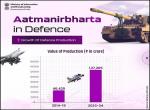Dr. Sudhir S. Bloeria, Vice Chancellor of the Central University of Jammu and Former Chief Secretary of Jammu & Kashmir
(This is the text of presentation made by Dr. Bloeria during Vimarsha series of talk at the VIF on 22 Feb 2013)
In this prestigious institution dedicated to the memory of Swami Vivekananda, it will be only appropriate to start my presentation with a famous quote from Swamiji which has been taken from “Taitreya Upnashid” and which means arise and awake.
The clarion call of “Arise and Awake” has almost become synonymous with the memory of Swamiji. The moot point in this quotation is the sequence of the words ‘arise and awake’. This is extremely significant, particularly in the context of present day environment, and to that extent it is relevant today as much as it was over 100 years ago in the then contemporary circumstances prevailing in India. That we have made considerable strides in all round achievements, more so after the economic liberalization was set in motion during the 1990s, is not in doubt; though most of the experts and laymen alike believe that India could have done much better, but for political squabbling, rank opportunism and the unfortunate game of one upmanship displayed by main national political parties and narrow political agenda of regional players. Though national economy is not the topic under discussion today, what we have to remember is that economic development and security concerns have to be addressed simultaneously and in tandem for any nation to make progress. National security without corresponding economic strength will not be sustainable for long. Similarly concentration on economic progress without necessary emphasis on security of the nation would bring grief and disaster. The history, particularly events of the last hundred years bear adequate and eloquent testimony to this reality. The current political environment in the country presents considerably bleak scenario. The primary concern of each major political entity appears to be keeping itself afloat and ahead of others, securing brownie points in the sordid game of upmanship, with unfortunate disregard to the national priorities and even of matters which seriously impinge on the national security. The narrative of common national priorities and consensus on matters vital to the security of India is missing from the national political discourse.
To make matters worse, there is a sustained attempt to attack and weaken the institutions by which democratic edifice of the nation stands secure and stable. A pertinent example in the recent memory stands out very prominently in this respect. While the crusade launched by Anna Hazare against wide spread corruption prevailing in the country is certainly welcome. But targeting the Parliament itself, questioning the legitimacy of the elected representatives of the people and demanding it’s dissolution through the means of street protests is highly questionable. That the organizers received support from some prominent political personalities is disturbing.
In principle, mobilizing the society to fight against the scourge of corruption is a very laudable endeavour and every right thinking person would support and pray for the success of such initiatives. But what was worrying in this context was the attempt and demand to ridicule and subvert the parliamentary system of governance which is the very basis of Indian democracy. This nation has paid huge price for independence from colonial power and the roots of democracy were assiduously nurtured by very tall and eminent political personalities belonging to the first generation of Indian independence. Cleanse the system certainly, but any attack on the elected bodies would not only seriously destabilize the system of governance but also adversely affect the security of the nation.
Undeniably two of the main pillars of any democratic system, including in India are the independent judiciary and a free, vibrant media. It goes to the credit of the Indian State and the country’s political leadership that both of these are functioning in a free environment and exceedingly effective manner. But unfortunately, there are ominous signs in the recent past that enhanced assertiveness and increased activism by both these important institutions are chipping, if not striking, at the institutions of governance of the country; having serious implications not only on the efficacy of the institutions per se but also on the very effectiveness of the executive branch of the government.
Things have been made much worse by a practically dysfunctional Parliament in the last couple of years. In an article published by The Hindu on December 18, 2012 a very articulate analysis made of the functioning of the Parliament indicates “…in its Winter session of 2011, the 15th Lok Sabha utilized only 70 per cent of the available time, the least in the last 25 years. Only 10 per cent of all starred questions were actually answered orally in both Houses and despite a total of 10 hours having been allotted for Private Members’ Bills over four weeks, no time was actually spent on them on account of repeated disruptions. … 27 per cent of all Bills passed by Parliament in 2009 were discussed for less than five minutes, 63 per cent of total parliamentary time was spent on non-legislative issues…. In 2010, the record had already been broken.”
Indeed an unfortunate state of affairs in the apex legislative body of the nation.
The Supreme Court of India which has justifiably earned a place for itself as one of the most effective apex courts in the world, with remarkable sensitivity to individual rights and freedom, has undoubtedly, been encroaching upon the turf, legitimately within the ambit of other two organs of the State viz. Executive and Legislative. It has been passing judgments, issuing directions and making caustic comments on issues like socio-economic rights, good governance and use of natural resources of the nation etc. Whereas all this may enhance the image of the judiciary in the eyes of the common man, this unfortunately is being ventured at the cost of the parliamentary efficacy and executive authority. This trend certainly denotes ominous manifestations for our democracy.
The media, particularly electronic media, has been playing a significant role in keeping the public informed about building of any crisis situation as well as taking a lead role in some significant exposes. However, the strident and shrill voices of leading anchors of TV channels and a select group of experts, at times end up damaging the system more than helping the public and in creating informed opinions. The concepts of self-restraint and self-regulatory mechanism have apparently not made any impact on the functioning of media. Instead of improving, the situation has been muddled by the selective use of media by almost all political parties for partisan purposes and short term gains. Since the efficacy and freedom of both judiciary and media are of extreme importance for successful functioning of the Indian democracy, the political community of the nation, across the political spectrum, will have to collectively work out ways and means to recover the lost ground and undertake measures which would help maintain the delicates and vital balance between all branches of democratic governance.
Another important aspect relates to the security issues pertaining to both internal as well as external dimension of national security. Here the current political environment presents a bleak scenario due to confrontations, contradictory and often disappointing stands and exertions of the political parties and organization across the national political spectrum. There are a number of parameters like management of general law and order situations, firmness in effectively dealing with separatism, extremism and terrorism etc. on which the country’s current standing and future profile can be measured; and this essentially requires consensual and joint national efforts notwithstanding the political differences.
It is a well known fact that our management of insurgency, more specifically in the north-east, and areas infested by left wing extremism has not been successful and main cause for this failure has been lack of clear thinking, foresight and resoluteness of political will. For decades together, in case of Nagaland more than half a century, the festering wounds there have not been healed, and grievances of the alienated population not redressed effectively. Even on the general law and order front, the response of Central and various State Governments has neither been effective nor exemplary. All across the country anti - social elements often comprising desperate as well as lumpen elements, at times in the garb of political activists, create disruptions in the normal day to day life of the citizens and indulge in arson, loot and damaging and burning Government property with almost total impunity. The State’s inability to bring the recalcitrant elements under control encourages them to create their own pressure groups with the result that the general law and order situation gets adversely affected by their activities. This trend has become apparent almost across the entire length and breadth of the country. The management of general law and order as well as the criminal justice system merits serious attention of the law and order machinery at the executive level and deep political contemplation of the policy makers as well. The most important step in this direction would be to dispel the belief that the trouble makers and the agitators can get away with anything from blocking the roads, or throwing stones at the government vehicles to looting and burning the public properties and assaulting public servants on duty.
Between the categories of armed militants and small time political adventurists there lies a spectrum of professional criminals. This section of anti social elements becomes more and more difficult to deal with as their access to arms and ammunition on easy terms keeps growing. This evil must be checked in the very incipient stage itself. Every small offence must be taken cognizance of and brought to its logical legal conclusion within the shortest possible time. It is distressing to note that the functioning of the law and order machinery at the cutting edge level has got almost blunted over the years. More than that of the executive, this is the collective failure of the political apparatus controlling the levers of power; particularly the handling of the state police forces and their gradual erosion of authority.
However, the matter that causes the gravest concern is the external threat to the national security manifested for the last over 60 years by the inimical activities of Pakistan and also, though for over a shorter period, the challenges posed by China to Indian territorial integrity and security. Added to this are various pulls and pressures of geo-strategic nature which keep varying in intensity and time frame depending upon the developments in the immediate neighbourhood as well as on the world scenario. Nowhere else, the failure of Indian political community in addressing the security interest of the country is more palpably apparent than in this sphere. Not only different political parties do not exhibit a common and concerted outlook and view on this issue of paramount national importance, the very act of strategic thinking and strategic planning appears to be missing from the national political discourse. India has failed to draw a duly identified and pronounced red line and sending a message that any party transgressing this parameter would be in distress.
All major powers, who ruled India in the recorded history, have displayed a remarkably identical understanding of the geo-strategic matters for the effective defence of this subcontinent. From the domains of Chandra Gupt Maurya to the Mughals and right up to the British Rule till 1947, these great powers had determined and made known to their adversaries that steps beyond particular boundary, would be considered an act of aggression and responded to accordingly. In the last century itself the British made their designs in respect of their Indian Empire extremely clear to the other competing and predatory imperial and expansionist power – the Russian Empire. Sample - just the two following examples :-
F.E. Knights in his book, “Where Three Empires Meet” published in 1919, has quoted Lord Curzon as saying, “Gilgit is the Gateway to India”.
Similarly in the scope and object of Defence of Indian Plan in 1927 it has been clearly laid down, “His Majesty’s Government are of opinion that the preservation of the existing frontier of Russia and Afghanistan is of vital importance to India and the British Empire in certain eventualities would be prepared to develop the whole forces of the Empire to preserve the integrity of Afghanistan and resist the extension of Russian dominion southward.”
In contrast to the predecessor imperial powers holding sway over the Indian land mass, for over two millenniums, the Indian state has, starting from 1947 war with Pakistan in J&K and continuing right up to the present date conveyed to the adversaries the following unambiguous signals –
- We will keep the conflict localized.
- We will not escalate, and fight only defensive battles.
- We will declare ceasefire when in a winning situation.
- Aggressor can keep the spoils.
By and large we have kept to this mode in 1947-48, 1965, in 1971 at the time of finalizing Shimla Agreement and also in 1999 in Kargil.
Unfortunately, instead of improving the national resolve and determination over the decades, the benefits of soft State have been extended to the separatist elements and the collaborators of the external powers working against India. While staying in India these people show respect to Pakistan, scant regard for India and simultaneously display with their conduct ample evidence of the feeling that they can get away with anti-India tirade and that they are above the law of the land.
It is high time that the nation stops looking at the security scenario and managing the external security parameters on ad hoc basis and changes to more comprehensive long term analysis of our security needs and takes tangible steps to address them. General Sundar Ji, a former Army Chief, once famously said that no country should go by the intentions of its neighbours and prospective adversaries, but take into considerations their capabilities and prepare accordingly; as the intentions can change over night but capabilities take years to build up. There is a lot of practical wisdom in this very sensible premise. The current short sightedness and ad-hocism in the policy planning relating to national security has been very aptly described by Air Commodore Jasjit Singh as the “Panipat Syndrome” where, in all the three battles the then rulers of Delhi waited for the enemy to advance right up to Panipat to give battle and ultimately all of them came to grief. The Indian ruling elite, encompassing elements from across the political spectrum have not displayed any greater maturity in this regard. There is an urgent need to change this mind set and address all important issues pertaining to national security in a deliberate, focused, sustained manner and on the basis of a long term and well thought out strategy.
Reference to a quote from Arun Shourie1 is very relevant in this respect. He said, “… each strike orchestrated by Pakistan reminds us, we are a country without options. The time when large armies could be sent across international borders is gone….(to effectively deal with Pakistan we need to do a Kashmir there). But a capacity to exercise such an option cannot be built up in a week, just because the terrorists have struck. It can be built only over 20 years, by unremitting effort over 20 years. But here, each government that comes, stops, if it doesn’t reverse initiatives that its predecessor had commended…. To meet the challenge from China we need to pursue policies for decades at a stretch. The political establishment is also hopelessly fragmented: it is not able to do the obvious things that are required for national security.”
In India like any other democratic nation, there is always a possibility of the country being ruled by different political parties and groupings. While it is legitimately expected from various political organizations to have their own political ideologies and preferred policies on certain issues relating to economic development as well as socio-political management, the matters relating to security of the nation – both internal as well as external – should always be subservient to political manipulations and one upmanship. The country expects a basic common approach from all major parties in this regard. But unfortunately that does not seem to be happening right up to the present time. This phenomenon is very aptly described by K. Subrahmanyam2, “Yet another serious security challenge this country faces is the tendency of our political class and the media to politicize issues of national security in a partisan manner. In all mature democracies, basic issues of national security are kept above party politics.. In those countries since there are frequent alternating changes of parties in government and opposition, the ruling party generally keeps the opposition informed of major developments in the field of national security. In India this does not happen.”
There is thus an urgent need to reverse this trend and reach consensus on at least the basics of security needs of the country by major political constituents. We see this happening in all successful and responsible democracies of the world. Why cannot our political class be sagacious enough to emulate this practice?
The Indian security has been under threat and lot of stress from Pakistan and China both. The inimical intentions of Pakistan have never been in doubt right from the day the two countries gained independence. The Chinese menace is looming large over national security for over five decades. Whereas our conventional military capabilities may be greater than Pakistan but this balance between India and China is definitely adverse to us and we need to be acutely aware of this fact. “While as we may not really think of China as an adversary in a real-time context but it would not be prudent to ignore the changing realities of military power that would provide the capabilities on which altered intentions could be based3.”
We would all do well to remember the famous premise of the great Chinese strategist Sun Tsu wherein he said that greatest form of generalship is to win a war without actually fighting it. There is a huge gap between the security perceptions evidenced in the contemporary political environment in India and actual situation on the ground, crying for serious and meaningful attention. This is the chasm that we have to cover. In short the political elements across the spectrum must come together, cooperate and help each other, for the sake of India, to achieve the following :-
- That the Parliament functions in a normal, orderly manner reclaiming its lost glory, dignity and standing as the repository of the sovereign power of Indian people.
- Ensure a fine balance between the legislative, executive and the judiciary; the three vital organs of the State.
- For security of the country, due and sustained attention should be paid to :-
a) Efficacy of law and order machinery, including the essentiality of undertaking police reforms.
b) Effective single-point coordination of the plethora of intelligence agencies.
c) Effective coordination of security and intelligence agencies operating in the insurgency areas.
d) The appointment of empowered CDS (Chief of Defence Staff) for a single point military advice to the political executive on security matters.
e) Make National Security Council and National Security Advisor functional and effective instruments as envisaged in the original proposal.
I would also like to refer to the disturbing trends of sectarianism, fundamentalism and intolerance raising their ugly heads in our society. Due to paucity of time, this issue is only flagged without making detailed analysis. However, I cannot restrain the urge to quote from an article written by Justice Markandey Katju, Chairman Press Council of India4.
“India is passing through a transitional period, transition from a feudal agricultural society to a modern industrial society. We are at present neither totally feudal nor totally modern. We are somewhere in between.
The transition period is a very painful and agonizing period in history. Since there is so much diversity in India the only policy which will work is the policy of secularism and giving equal respect to all communities. Otherwise India will break up into a hundred pieces since there is so much diversity.”
The importance of India as a rising economic phenomena and established regional power cannot be under-estimated and India is poised for a much greater role in the world affairs and ever increasing influence on the geo-strategic scenario that would emerge between major powers of the world during the 21st century. In a very incisive analysis made by Robert D. Kaplan in his latest book titled “The Revenge of Geography” he alludes to this fact “As the United States and China become great power rivals, the direction in which India tilts could determine the course of geopolitics in Eurasia in the twenty-first century. India, in other words, looms as the ultimate pivot state. It is the Rimland power writ large. India, located in the center of the Indian Ocean littoral, is critical for the seaward penetration of both the Middle East and China.”
How much of influence and importance our country is able to garner in the years and decades to come would primarily depend on how well our technical, managerial and economic resources are managed with prudence, initiative and imaginative drive. And for that to happen, it would be imperative for the political class in this country to reach mutually acceptable and essential common denominators on the crucial aspects of economic policies which would drive India to the front ranking stage in the world economy; as well as, a well thought out strategy to skillfully manage the existing and potential security threats to the nation both from within as well as outside.
Endnotes
- Arun Shorie, “India’s Defence Policy-Safeguarding National Security,” USI Journal of April-June, 2009.
- K. Subrahmanyam, “Challenges to Indian Security,” USI, Oct – December 2000.
- Air Commodore Jasjit Singh,AVSM,VrC,VM(Retd), “Security Environment in 2025: India’s Interests and Strategies,” – USI January-March 2007.
- Justice Markandey Katju, “What is India?” - Frontline, February 10, 2012.
Published Date: 7th March 2013









Post new comment